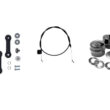Want to keep your car running smoothly for years to come? Here are some tips:
By following these tips, you can increase the average lifespan of your car and keep it running like new for years to come.
How Better Electronics Can Extend the Life of Your Car
As technology continues to advance, modern cars are built with better electronics that have greatly improved the lifespan of vehicles on the road. The latest electronic systems in cars allow for more efficiency and accuracy, which translates to a smoother ride and better fuel economy. These improvements directly impact the longevity of a car by reducing the wear and tear on components, ultimately extending the life of the car.
The latest electronic systems in cars are able to monitor and control sensors such as oxygen sensors and exhaust gas temperature sensors, which allow the car to run at optimum performance levels. With better electronics, cars are also able to utilize advanced features such as collision avoidance systems, adaptive cruise control, and lane departure warning systems that can minimize the risk of accidents on the road. These systems not only protect the driver and passengers but also prolong the lifespan of the car.
The Importance of Efficient Running for Your Car’s Longevity
Vehicle maintenance is essential to the longevity of a car, and running the car efficiently is one of the most important factors in extending its lifespan. Efficient running involves regular maintenance such as regular oil changes, replacing the air filter, and rotating the tires to ensure that the car runs at peak performance levels.
Efficient running also involves careful driving habits that reduce wear and tear on the car, such as avoiding sudden stops and starts and shifting gears at appropriate times. Consistent and efficient driving habits can significantly reduce fuel consumption and extend the lifespan of the car by avoiding damage to the engine and transmission.
Debunking Myths: Common Misconceptions About Car Lifespans
There are many myths surrounding the lifespan of a car. One of the most common myths is that a car’s lifespan is solely determined by its age. However, a car’s lifespan is determined by a combination of factors such as maintenance, driving habits, climate, and terrain.
Another myth is that a car should be replaced once it has reached a certain number of miles, such as 100,000 miles or 200,000 miles. However, with regular maintenance and efficient driving habits, a car can easily last for 200,000 miles or more.
Myth debunked: Regular maintenance and care can significantly extend the lifespan of a car beyond what many people may think.
Consumer Reports’ Findings: 8 Years or 150,000 Miles?
Contrary to popular belief, a study by Consumer Reports found that the typical lifespan of a car is about 8 years or 150,000 miles. However, this estimate only applies to cars that are properly maintained and driven efficiently. Cars that are neglected and poorly maintained, or driven recklessly, will not reach this milestone.
It is important to note that this is only an estimate and that the actual lifespan of a car will vary depending on factors such as maintenance, driving habits, and environmental conditions. With proper care and maintenance, cars can easily surpass the 150,000-mile mark and provide many more years of reliable service.
How Regular Maintenance Habits Can Prolong Your Car’s Lifespan
Regular maintenance is essential to prolonging the lifespan of a car. Regular oil changes, tire rotations, and air filter replacements are just some of the ways to ensure the car runs at peak performance levels. In addition, regular inspections of the brakes, suspension, and fluid levels can help catch and prevent potential problems before they turn into major and costly repairs.
Another important aspect of regular maintenance is following the manufacturer’s recommended service schedule. This schedule outlines the recommended maintenance tasks and intervals for the specific make and model of the car. Adhering to this schedule can prevent major problems down the road and ultimately extend the lifespan of a car.
Note: Regular maintenance not only extends the lifespan of the car but also enhances its resale value and allows it to perform at its best.
Factors Affecting Your Car’s Lifespan: Weather, Terrain, and Driving Habits
Weather, terrain, and driving habits can all affect the lifespan of a car. In areas with harsh winters, salt and other chemicals used on the roads can cause damage to the car’s undercarriage and components, causing them to rust and deteriorate faster. Driving on rough terrain, such as unpaved roads, can also cause wear and tear on the car’s suspension and other components.
Additionally, driving habits can significantly impact the lifespan of a car. Aggressive driving, such as sudden stops and starts and speeding, can put excessive wear and tear on the car’s engine and transmission, shortening its lifespan. It is important to drive safely and efficiently to extend the lifespan of a car.
In conclusion, the lifespan of a car is determined by a combination of factors such as regular maintenance, efficient driving habits, and environmental conditions. With proper care and attention, cars can easily surpass the estimated lifespan of 8 years or 150,000 miles. Remember, regular maintenance not only prolongs the lifespan of a car but also enhances its performance and resale value.



